Iran's Rising Housing Costs Squeeze Workers' Incomes
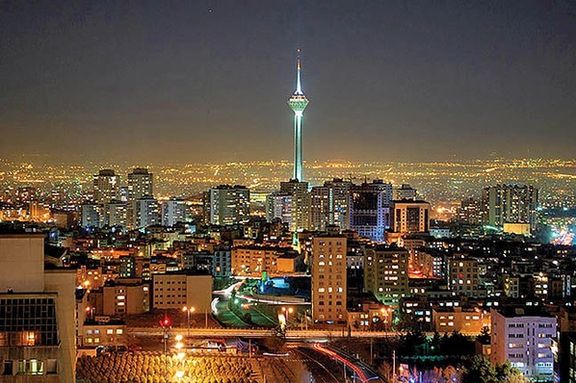
A recent report shows severe economic challenges faced by workers in Iran with approximately 55% of laborers' wages being allocated towards rent.

A recent report shows severe economic challenges faced by workers in Iran with approximately 55% of laborers' wages being allocated towards rent.
In the capital, Tehran, the proportion is even more alarming, with workers spending an astounding 100% of their wages on housing expenses.
More than 60% of wage earners and retirees in Iran find themselves grappling with rising rental costs, as revealed by ILNA's case study on the share of housing rent in several Iranian cities. In Rasht city in the north, rent can be as much as 70%, and in Zahedan, up to 60% of a laborer's monthly wage.
The minimum wage for a married worker with all benefits hovers just above $180 per month, while the minimum cost of food for an average three-person household is at least $140 to $160.
Babak Negahdari, the head of the Parliament's Research Center, recently stated that housing prices and rents have surged tenfold since 2018. However, wages have not kept pace with these exorbitant increases.
The economic disparity persists while reports indicate that the average monthly expenses for housing in Tehran province surged from $100 in 2021 to $160 over the last year. Furthermore, Iran's Statistics Center reveals that costs for housing, water, sewage, fuel, and electricity have surged by nearly 60% in 2022.
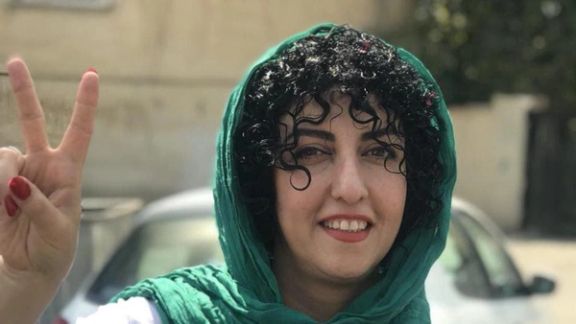
A group of independent rights experts from the UN has called for the release of Iranian Nobel laureate Narges Mohammadi.
Last week, the imprisoned Iranian activist was awarded the Nobel Peace Prize in spite of her imprisonment at the notorious Evin Prison in recognition of her fearless dedication to women's rights in Iran.
She is currently serving an extended jail term for charges related to "spreading anti-state propaganda," as stated in a press release from the UN Human Rights Council-appointed Working Group on Arbitrary Detention.
Since she began her campaigning, she has faced multiple arrests, with her initial detention occurring in 2011 due to her advocacy on behalf of imprisoned human rights activists and their families. In 2015, she was rearrested and handed additional prison sentences.
The UN Working Group on Arbitrary Detention highlighted that Iranian authorities persist in depriving Mohammadi of her freedom, despite concerns about her deteriorating health in detention and against the advice of medical professionals. Her detention runs counter to Iran's international human rights obligations.
The experts expressed deep regret that despite calls from the United Nations and the international community, Iranian authorities continue to criminalize Narges Mohammadi for her human rights advocacy.
The UN group consists of five independent experts appointed by the UN Human Rights Council. Their mandate includes investigating cases of arbitrary detention which goes against international standards outlined in the Universal Declaration of Human Rights and other international legal instruments accepted by the concerned States.
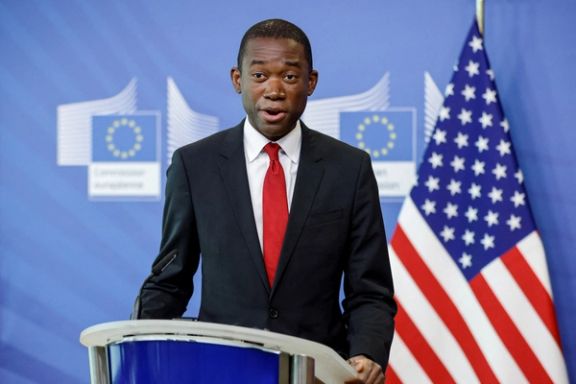
The United Sates and Qatar have apparently agreed to stop Iran from accessing $6 billion in released funds, on deposit in Qatari banks, for humanitarian purchases.
US Deputy Treasury Secretary Wally Adeyemo has told House Democrats that after the October 7 bloody Hamas attack on Israel and the death of more than 1,000 civilians, the US and Qatar reached the deal to deny Iran the use of the funds for buying non-sanctionable goods, the Washington Post reported.
CBS News called it a "quiet understanding", not a formal agreement.
The Biden administration reached a hostage release deal in August to allow South Korea to unblock $6 billion of accrued Iranian oil income and transfer the money to Qatar in exchange for the release of five Americans held by Iran. The deal led to sharp criticism by Republicans, some Democrats and Iranian American activists, who labeled the released funds as “the biggest ransom payout in history”, which would embolden the Iranian regime and encourage hostage taking around the world.
According to the report, Adeyemo told lawmakers that the money “isn’t going anywhere anytime soon.”
During a presser from Israel on Thursday evening, US Secretary of State Antony Blinken was asked about the Washington Post report. “None of the funds that now have gone to Qatar have actually been spent or accessed in any way by Iran,” he said dodging a direct answer if the US have agreed to block Tehran’s access to the money.
“Funds from that account are overseen by the Treasury Department and can only be dispensed for humanitarian goods; food, medicine, medical equipment, and never touch Iranian hands. We have strict oversight on the funds, and we retain the right to freeze them,” he added.
Critics of the White House’s decision to give Iran access to the $6 billion argue that the money is fungible and that any funds Iran receives, regardless of how it can spend it, would free up more money for it to fund terrorism.
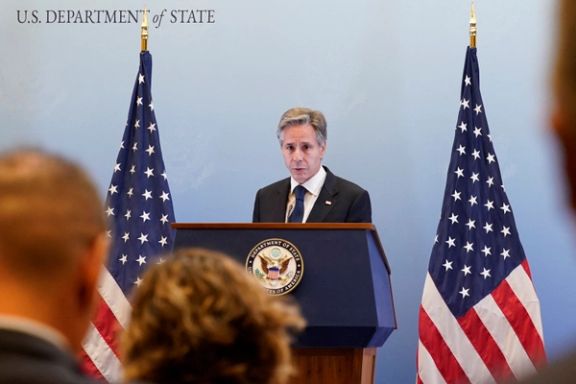
In a statement after the publication of the report, Iran’s mission at the United Nations rejected Adeyemo’s claim, saying that "This news is not true, and its publication questions the credibility of The Washington Post." "US senators and government are fully aware that they cannot back out of the agreement,” Iran’s state media cited the mission as saying. Nour News, linked to Iran's Supreme National Security Council, also reported late on Thursday that contrary to the Washington Post’s report, Iran has full access to the funds in Qatari banks.
On Wednesday, Treasury Secretary Janet Yellen said, “These are funds that are sitting in Qatar that were made available purely for humanitarian purposes and the funds have not been touched. I wouldn’t take anything off the table in terms of future possible actions.”
Before Yellen, John Kirby, spokesperson US National Security Council had suggested that the funds “can be re-frozen” at any time. In an interview with MSNBC, Kirby said: “None of it has been allocated. None of it has been spent.”
A bipartisan bill has been introduced in the US Senate to stop the use of the funds by Iran.
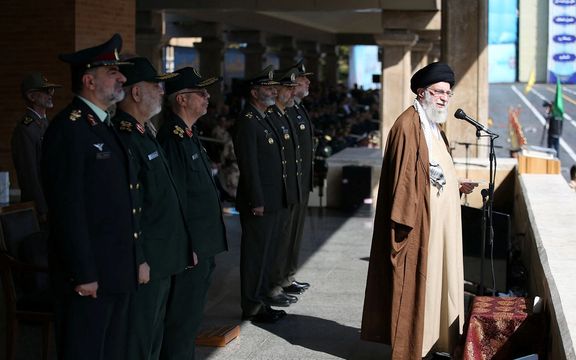
A centrist daily in Tehran has warned Iranian officials to avoid radical comments about the war between Hamas and Israel.
Ham Mihan newspaper warned the officials that comments in support of Hamas might invite trouble for Iran and its national interests as foreign countries might take advantage of such provocative comments to prove that Iran was behind the attack by Hamas.
Although the United States and Israel have not directly implicated Iran, many Iranians on social media have provided incriminating substance against Tehran, including a comment by Supreme Leader Ali Khamenei who said in previous years: "We intervened [in regional conflicts] due to our enmity with Israel and the result was the victory in the 33-day and 22-day wars. We will help any group that would fight Israel."
On the first day of Hamas's attack, Khamenei's senior military adviser Yahya Rahim Safavi also reiterated Iran's support for Hamas and said: "We support the operation #Al-Aqsa _Storm. Certainly, the #Resistance_Front also supports this operation. We congratulate the Palestinian combatants for this operation. Certainly, ‘the defenders of the haram’ [Official jargon to refer to the Iranian militia in Syria] and great martyrs such as [Former IRGC Qods Force Commander] Qassem Soleimani are accompanying these combatants. We stand with you until the liberation of #Palestine."
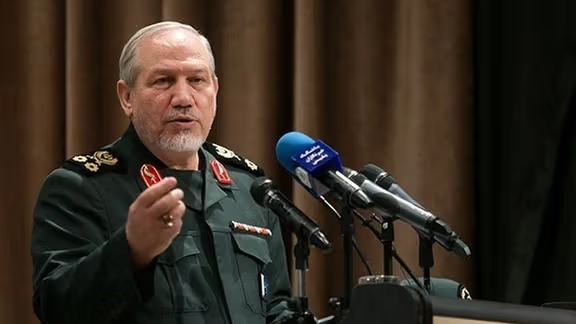
However, as many Iranians noted on social media, Khamenei took back his words in a softened comment after warning by US officials about possible retaliation and said: "The Islamic Iran is being named as the country behind this move [by Hamas]. But they make a mistake. This was done by Palestinians themselves.
Ham Mihan noted that certain statements by Iranian officials have raised concerns regarding international reactions. The daily also cautioned that the pro-Hamas propaganda on state TV, under Khamenei's supervision, will not only anger foreign governments but also negatively impact the mood of the Iranian people, potentially turning them against the government. This has already been evident on social media, especially given the Iranian public's keen attention to content broadcast on foreign-based Persian satellite TV.
In Iran, conservative commentator Nasser Imani suggested that the international community should distinguish between Iran's financial and spiritual support for Palestinian groups and Tehran's alleged involvement in aggressions like the October 7 attack by Hamas. However, he appeared to overlook the fact that Iran's financial support could readily translate into missiles, drones, and other weaponry.
Meanwhile, Iranian Israeli commentator Meir Javedanfar told Iran International TV, which has been broadcasting one of its flagship news bulletins live from Jerusalem this week, that Israel has been garnering international support for an all-out attack on Gaza. Javedanfar added that at the same time Israel is collecting intelligence about Israeli and other hostages' whereabouts to keep them safe from the impact of air raids.
Javedanfar added that Israel also calls residents of buildings in Gaza or sends SMS warnings to them in advance about incoming attacks. However, he said Israel is adamant to expel Hamas leaders from Gaza, although some of them live abroad with their families.
Another commentator, Ben Sabti, a researcher in Iran-Israel affairs, talked with Iran International about the possibility of Iran getting involved in the conflicts. Sabti Said: "This is a different kind of war and Hamas’ missile attacks which were examples of an all-out war by an army rather than a group indicate that Iran's Islamic government was involved by offering guidance or by sending money and providing weapons."
Sabti added: "We see that Hamas leaders take part in regular meetings with the IRGC Qods Force, and this is not something Israel could possibly ignore. If Israel does not target the snake's head and does not deal a hard blow to the Iranian regime, the same kind of attacks will reoccur in a few months from now." He stated that a siege on Gaza or military attacks alone are insufficient to eliminate Hamas, as their leaders are hiding in tunnels and won't be easily affected.
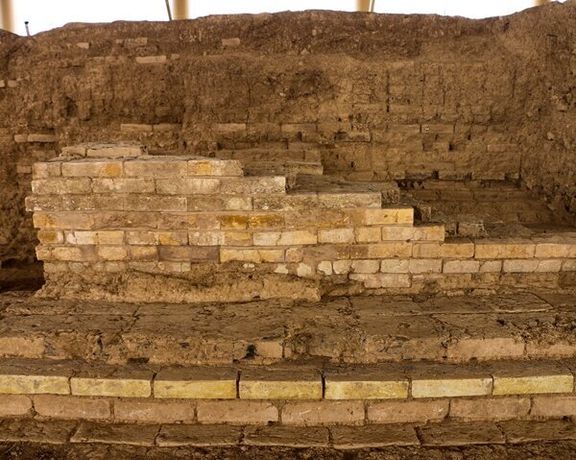
In a recent archaeological discovery at the ancient site of Persepolis, Iranian archaeologists have revealed the eastern wall of a grand historical gateway.
The remarkable structure, also referred to as the Gate of Cyrus, spans an impressive 40 meters in length, 10 meters in width, and boasts a substantial thickness of five meters, constructed entirely from a combination of bricks and tiles.
One of the fascinating construction techniques employed in the creation of the Gate of Persepolis in Pasargadae is the extensive use of bitumen mortar.
Notably, the most recent findings have brought to light a striking array of glazed bricks adorning the entirety of the gate's eastern wall. The vibrant, glazed tile panels feature depictions of legendary animals, eight-petaled flowers, and a palette of glazed bricks in shades of white, yellow, blue, and green, suggesting that, during its zenith, this gateway stood as one of the most renowned in the ancient world.
Situated approximately three kilometers northwest of Persepolis, in the area known as the Firuzabad Garden, the ancient site recognized as Tal-e Ajori, has revealed remarkable insights into the historical past.
The monumental structure once provided access to a royal garden known as "Paradise," which included a grand palace that now lies in ruins at the Firuzabad site. Over time, the commemorative gateway was abandoned during the Achaemenid era, later succumbed to the destructive force of a significant earthquake and was subsequently subject to plunder during subsequent eras.
At the height of its power, the Achaemenid empire established by Persian monarchs Cyrus and Darius in 550 BC extended from the Balkans to Central Asia. It notably set the precedent as the first state model founded on principles of diversity and a remarkable tolerance for various cultures and religions.
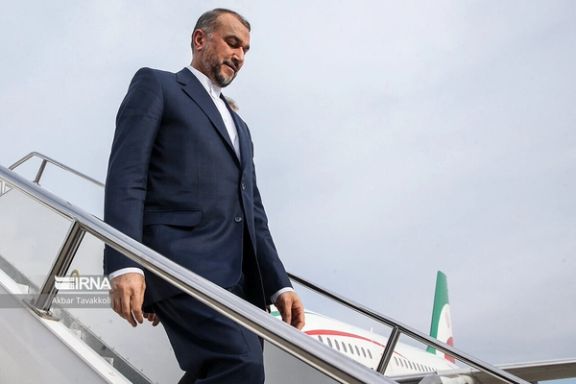
Iran's Foreign Minister Hossein Amir-Abdollahian is to start a regional tour with the aim of addressing the ongoing Israeli-Palestinian conflict on Thursday.
The tour, which includes visits to Iraq and Lebanon, was officially announced by Iranian state media and will begin with Amir-Abdollahian's visit to Iraq, followed by a subsequent trip to Lebanon.
"In light of the current Palestinian events, the crimes committed against Gaza and their dangerous ramifications, the foreign minister's regional trip will start today", Iran's ambassador in Lebanon said on social media.
Overnight, the Iranian FM held discussions with his Emirati counterpart, Sheikh Abdullah bin Zayed, during which he called upon Islamic and Arab countries to extend their support to the Palestinian people, emphasizing the urgency of the situation.
Iranian President Ebrahim Raisi also engaged in separate telephone conversations with Syrian President Bashar al-Assad and Saudi Crown Prince Mohammed bin Salman about the Israeli-Palestinian conflict.
Before the outbreak of the Hamas-Israel conflict, Iranian officials had made frequent diplomatic visits to Syria and Lebanon as part of their regional strategy. Tehran has a long history of supporting various terror groups, including Hamas, Islamic Jihad, and Hezbollah.
The Islamic Republic’s support for Palestinian groups has been a source of tension and conflict in the region. It has contributed to ongoing instability in the Middle East and has often been a point of contention in international relations, particularly in the context of negotiations and peace efforts in the Israeli-Palestinian conflict.
Additionally, Iraqi groups aligned with Iran have issued a warning that they may become involved in the Hamas-Israel conflict should Israel intensify its attacks on Hezbollah. The development, amidst rapidly rising tensions, has raised concerns about the potential for a wider regional conflict.